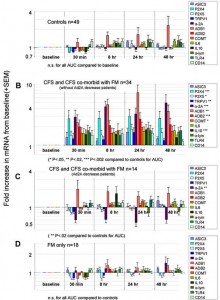“This grant is the outcome of many years of talking to other scientists about ME/CFS and merging that information with other important findings.”
It’s rare to find a study with so many interesting angles. The fact that it’s focused on post-exertional malaise (PEM) makes it all the more interesting.

This studies got lots of angles. If it worked out it could tell us a lot about post-exertional malaise
Dane Cook PhD has done a lot of work on exercise and Chronic Fatigue Syndrome (ME/CFS). He hasn’t gone the two-day exercise test route. Instead, he’s focused on the effects of physical or mental exertion on brain functioning, sleep, cytokines, symptoms and respiration in ME/CFS and GWI.
In this small (15 person) but big (i.e., multidimensional) pilot study he’s attempting to put some major pieces of the puzzle together. Combining different biological systems in one study to see how they interact in ME/CFS is something of a theme for SolveME/CFS (formerly CFIDS Association of America) and Cook does it in spades. First he hits people with ME/CFS with the biggest stressor of all – exercise – and then examines how their brain functioning, symptoms, and gene expression change.
On Sept 18th in a SolveMECFS webinar he’s going to announce the results.
(This study is women only. Given the modeling findings from the Center for Neuroimmune Medicine indicating that ME/CFS men may in some ways be physiologically different from women, men should take note that this is an all-female study.)
Let’s look at the study more closely. It involves three days worth of testing.
Three Day Test
- First Day – The gene expression, cognitive function, and symptoms of fifteen women with ME/CFS (no controls noted in the description) are going to be assessed in Day One. A functional MRI (fMRI) focused on areas of the brain associated with fatigue will assess the brain functioning as they complete a cognitive exercise.
-
Second Day – The next day they’ll hop on the bike for twenty-five minutes. They are not exercising to collapse; this is not a VO2 max test. (Staci Stevens has said this test, which is much longer than the VO2 max test, may actually be more difficult). This exercise test appears to be similar or identical to what was done in the Light’s exercise and gene expression test. (Hopefully, it’s similar or identical to the exercise test being done in the CDC multisite study, which is also analyzing the expression of the genes found in the Light study, among others.) Blood tests will be administered to assess gene expression.
- Third Day – The cognitive challenge will be repeated with the fMRI, and more blood tests will be administered.
Findings
Be prepared for a complex and fascinating presentation on the 18th.
Gene Expression
Targeting (and hopefully validating) the Lights’ findings of enormous changes in the expression of genes involved in assessing muscle damage and sympathetic nervous and immune system functioning during exercise would be a big deal. I’m crossing my fingers that it happens.
A reference to Broderick’s finding of increased expression of immune genes associated with Epstein-Barr virus activation suggests Cook is checking out specific immune genes as well. Finding increased expression of EBV associated genes after exercise could suggest that enigmatic bug plays a role in producing the PEM ME/CFS patients experience.
EBV is in it’s up and down mode with ME/CFS again; right after the Lipkin study found no evidence of EBV activation, a German study using different techniques suggested EBV activation was common. A finding suggesting EBV activation may be occurring during or after exercise would be intriguing indeed. Exercise does, after all, commonly invoke ‘sickness behavior’ symptoms in ME/CFS.
Brain Functioning
In a prior study Cook found reductions in oxygen uptake in parts of the brain when people with ME/CFS did cognitive tests – and that study did not include exercise. Now we’ll see what effects “moderate” exercise (moderate for healthy people) has a day later has on oxygen uptake and mental ability in these ME/CFS patients. My guess is that exercise is not going to help matters…
Putting it All Together
Integrating all the data together may allow Cook to identify key genes whose expression is altered by exercise and which appear to contribute to declines in brain oxygen uptake (fMRI), cognitive functioning (cognitive tests), and symptoms. If they are found they could be targets for treatments that either turn them off or back on depending on their level of expression.
It would be interesting, indeed, if Cook finds genes that were highlighted in the recent SolveME/CFS epigenetics study. Future targeted epigenetic studies could then determine if methylation processes were turning them on or off in ME/CFS.
The promise of this study is great. We’ll see how it turns out on the 18th. Cook’s gotten a couple of big NIH grants before. If this multidimensional pilot study pans out, he should be in line for another big one.
- Register to view the Webinar on Sept 18th from 2 – 3pm ET here.









There it is again: EBV. I think EBV is messing up the B-cells. Therefore Rituximab is working.
25 minutes on a treadmill?!! That’s not going to happen!
🙂
I imagine as a young enthusiastic scientist/Phd that genetics must be truly exciting. I wonder though as I must miss these talks and when I went back to listen to Susan Vernon’s talk I just couldn’t bear it, has there been any real results from these studies?
I know in Cystic Fibrosis they found a cure for a type but that was an inborn genetic abnormality. I know in diabetes they now know there are at least 6 or more genetic causes of Type 2- but it does them no good. I remember 35 years ago when I got out of Medical school going to cancer lectures and hearing we were “so close”- yet most people who are honest admit we’re no closer than we were 30 years ago.
I’d love to hear specific cures or drugs that come out of these gene expression studies.
Greg
Are there slides or anything available after the webinar?